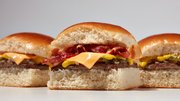News
McDonald’s commits to further health and wellness strategies
September 22, 2014
In a letter to World Health Organization Director-General Dr. Margaret Chan, CEOs of food and non-alcoholic beverage companies and members of the International Food & Beverage Alliance, which includes McDonald's, announced a set of enhanced global commitments that will guide their health and wellness strategies for the next several years.
According to a news release, these strategies are based on a set of actions recognized by WHO and governments to "help improve global health."
IFBA members have committed to reformulating and innovating products with the goal of making available food and beverage choices that help people eat healthier. Each member will publish a specific corporate commitment which details its goals and progress in this area by the end of this year.
Progress report
As outlined in the IFBA's new report, "Five Commitments in Five Years: Review of Progress 2008 – 2013," McDonald's announced that more than 95 percent of its restaurants around the world now offer fruits, vegetables or low-fat dairy offerings in Happy Meals.
McDonald's also pledged to reduce its salt/sodium, sugar or calories across its menu in nine of its top markets by 2020. Specific goals for each market will be determined in 2015.
Specific sodium reduction efforts have already been made in Australia (reduction of 20 percent in American cheese slices); Canada (a 45-percent reeduction in grilled chicken); and Europe (20 percent-reduction of salt dispensed on French fries).
In the US, McDonald's switched from 1-percent low-fat chocolate milk to fat-free chocolate milk in Happy Meals. When the new Happy Meal, with low-fat yogurt and fruit, was introduced in 2012, calories were reduced by about 18 percent.
McDonald's also reformulated its menu between August 2012 and July 2013 to include more vegetables and fruit, claiming that more than 410 million cups of vegetables were served in menu offerings during that time; and more than 200 million cups of fruit were served.
Nutritional information and children's marketing commitments
Additionally, according to the release, IFBA members will implement, by the end of 2016, a common global approach to the provision of nutrition information on packaging, at points of sale and through other channels.
Members will also expand the IFBA Global Policy on Marketing and Advertising to Children, which provides that members either do not market products to children under 12 or if they do, limits what products can be marketed to children under 12. Currently applicable to TV, print and Internet, by the end of 2016 the expanded global policy will cover significantly more media; and ensure that members do not use marketing techniques in ways that are primarily directed to children under 12 for products that do not meet better-for-you nutrition criteria.
In its letter to Dr. Chan, the IFBA states:
"We market responsibly to children everywhere our products are sold around the world. Our current policy requires members to only advertise products to children under twelve years of age on television, in print and online that meet our companies' specific nutrition criteria – or not to advertise to this age group at all. Our new commitment, which will be rolled out over the next two years, has been significantly expanded to cover all media and to ensure that marketing communications for products that do not meet nutrition criteria are not designed to appeal primarily to children under twelve.
Our companies will also seek to harmonize nutrition criteria, on a regional or national basis, to provide a strict common standard, as we have done in the European Union and the United States."
The IFBA came together in 2008 to "help people around the world achieve balanced diets." In addition to McDonald's, it includes The Coca-Cola Company, Ferrero, General Mills, Grupo Bimbo, Kellogg, Mars, Mondelēz International, Nestlé, PepsiCo and Unilever.
 ChatGPT
ChatGPT Grok
Grok Perplexity
Perplexity Claude
Claude








